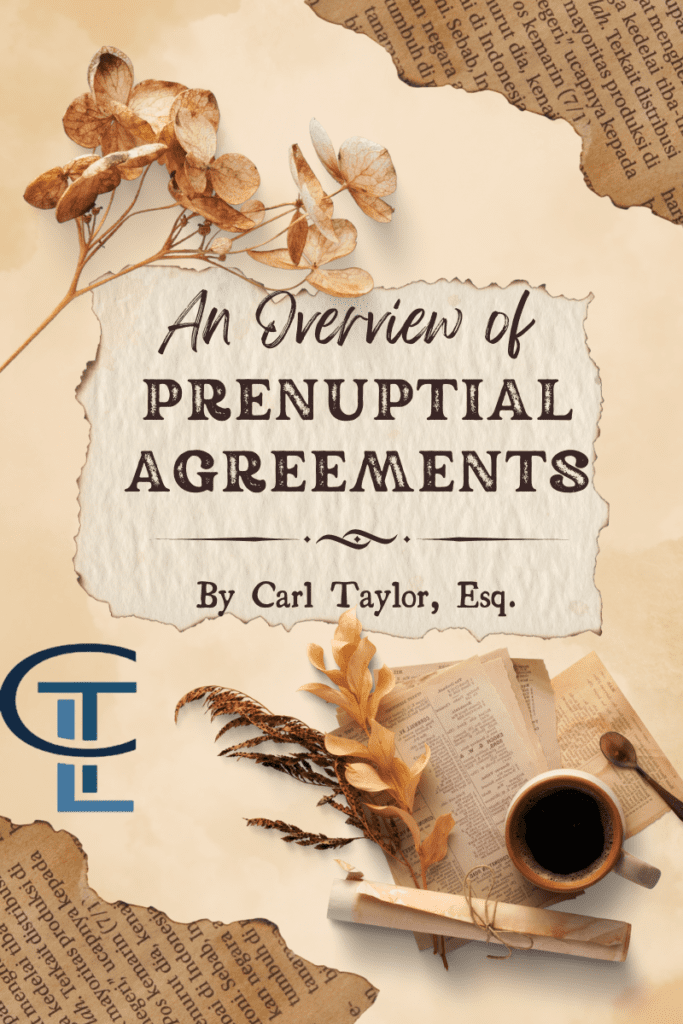
As a divorce lawyer, one of the things I wish everyone knew was this: prenuptial agreements makes a lot of sense. They are not just for the rich or the famous, and they are not going to doom your marriage. They are a contingency plan, a form of insurance, and they are vastly underutilized.
A Word on Prenuptial Agreements – For Those Who Intend to Marry or Remarry
Throughout my years of practice, I have often negotiated prenuptial agreements for couples contemplating marriage but looking to set specific parameters in the event of their divorce or the passing of one of the parties. I always refer to prenuptial (also known as a premarital agreement or antenuptial agreement) agreements as the most-tricky document to negotiate in the realm of family and divorce law–as certain objectives are sought in the negotiation–but negotiating too much can potentially upset an otherwise happy couple.
Although prenuptial agreements are more common in second marriages and/or where one or both parties have accumulated substantial wealth, prenuptial agreements are becoming increasingly common among all age groups and asset classes. This is a good thing!
That said, there is often one party that is the driver of the prenuptial agreement. Sometimes, that party isn’t even the one getting married. (I’ve noticed over the years many parents are actually the driving force behind their child’s premarital agreement).
Should You Agree to a Prenup?
With all that said, what should you do if you’re engaged and your spouse asks you to enter into a prenuptial agreement? Or if you’re looking to remarry, should you demand a prenuptial agreement the second time around?
First we must define what is the purpose of a prenuptial agreement? Indeed, what is a Prenuptial Agreement?
To first answer that question, it’s perhaps important to better understand what a prenuptial agreement is and isn’t. Prenuptial agreements are a form of contract setting forth an understanding between the parties about their marriage and the end of their marriage. It is required that this agreement be made prior to the marriage (although reconciliation and postnuptial agreements are sometimes contemplated by New Jersey law).
A prenuptial agreement only becomes enforceable upon the parties actually marrying. Such agreements can be quite simple or very complex. As a form of contract, the parties are given great leeway in drafting the agreement’s specific terms and language.
To be valid a New Jersey Prenuptial Agreement must be in writing or it will not be enforceable. They must also have a “statement of assets” annexed/attached to the Agreement. Like most contracts, “consideration” must be given, and the Agreement must also be signed by both parties so as to be legally binding. Both parties must be represented by independent legal counsel.
Under the Uniform Premarital Agreement Act, the parties may contract respecting some of the following types of issues:
• Rights and obligations relating to real property and the disposition of such property;
• Choice of Law for a separation/divorce/etc.;
• Spousal support;
• BUT NOTE: prenuptial agreements cannot waive a child’s right to support from either parent and cannot address custody or parenting time issues.
• To be enforceable a prenuptial agreement cannot be unconscionable (as judged at the time the agreement is entered into and not at the time it is sought to be enforced–as modified by 2013 bill signed by Governor Christie).
• The agreement cannot be made under duress.
• Also, it should generally be made with sufficient time to review and negotiate and both parties should have independent counsel.
• It should also be noted that the burden of revoking or amending a prenuptial agreement (absent consent) inures to the party that is seeking to invalidate the agreement.
• Finally, it should be noted that certain protections are in place in New Jersey even absent entry into a prenuptial agreement. For instance, non-commingled pre-marital property generally remains separate property in New Jersey. So if you own a home in your name and do not commingle that asset (or allow your new spouse to provide labor, equity, or significant seat-equity into the home), then that house should generally remain separate regarding equitable distribution at the time your separate or divorce. Likewise, inherited property or gifted property (along with portions of most personal injury awards will remain separate property provided they are not commingled.
Hopefully the above information provides you with a better understanding of a New Jersey prenuptial agreement and helps you consider a prenup for your own marriage.

Partner with Carl Taylor, Esq.
Ready to Find Your Happily EVEN After? Call Today at 609-359-3345 to Schedule a Confidential Consult (or click here to self-schedule online) and Receive a Free Copy of the 3rd Edition of my 200+ page book, Happily EVEN After: The Guide to Divorce in New Jersey.

Pingback: Should I Sign a Prenup? - Carl Taylor Law Firm, LLC